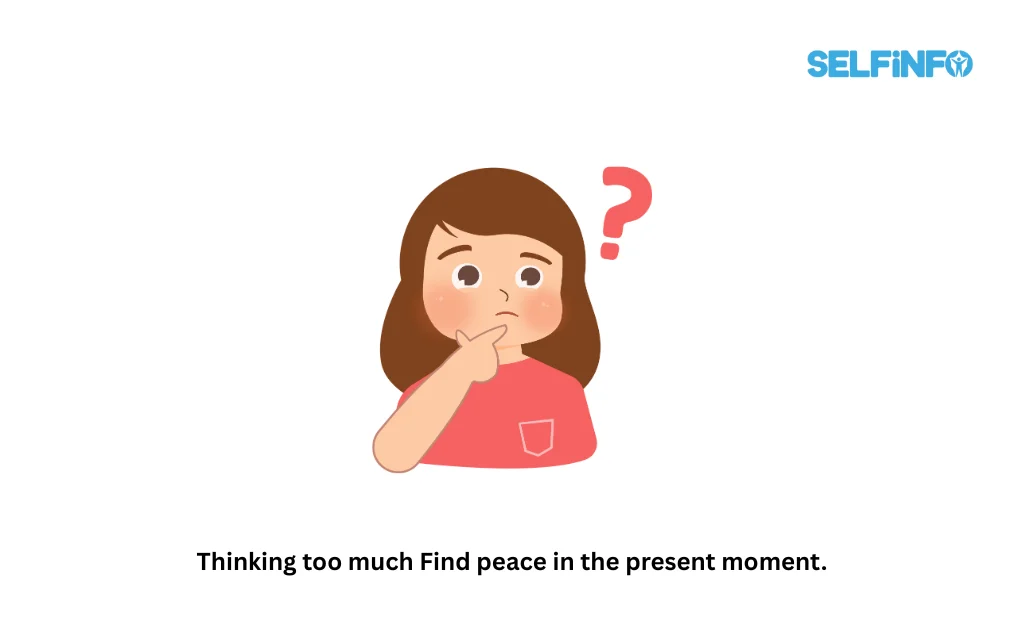When I initially began to practice Zen (or present), I imagined I could lose all awareness of my surroundings. I made my bed without thinking. I washed my hands without thinking. idly strolling around. Just think about the spiritual experience!
However, it was not what I had anticipated.
The truth is that my thoughts was always racing. Whatever I did, I would never be able to have even a second of quiet because a billion thoughts would keep coming out of my head. I would then shout to myself, “All right, enough. Now get your mind off of it! Quit thinking!
I thought about all I had learned in a frenzy. “Now, what method should I employ?” “What would a master do?” I would ask myself. I must be able to do something to calm my thoughts.
My mind got noisier the harder I pushed myself. Despite my best efforts, I was unable to succeed. Actually, it made matters worse. My inner monologue and thoughts would become even more erratic. I felt angry and frustrated with myself.
I was never at ease during the first few years of Zen and meditation practice. Not even close. But I persevered.
I eventually discovered the solution as my knowledge of spirituality increased. I was too preoccupied with destroying my thoughts. Even though they were the same things I was attempting to get rid of, I developed an obsession with them. I let go as soon as I realized it, and I feel free .

1. Understand it is impossible to silence your mind.
It is our nature to think. It indicates that your brain is sound and working. We do not even need to eliminate our thoughts. Why?
Our mind thinks, just as our body feels, our nose smells, our tongue tastes, our ears hear, and our eyes see. You must kill the corresponding organ if you wish to eliminate a certain function. The fundamental idea is straightforward: Unless a person is deceased, their mind is never completely thoughtless.
In reality, I was doing the impossible when I attempted to stop my thoughts. I cannot stop my mind from thinking, any more than I can stop my eyes from seeing or my ears from hearing.
2. Don’t judge yourself.
A mind that is quiet is not one that is thoughtless. Instead, it is a choice you make to accept all of your feelings and thoughts.
The irony is that your mind will relax if you accept every idea you have, regardless of how bothersome it may be, without passing judgment.
Do not fight your thoughts, then. Do not be hard on yourself for overanalyzing. You are causing yourself needless worry and distress if you do. Your mind’s primary purpose is thinking, and whether you like it or not, you will hear mental conversations.
You are resisting the inevitable if you attempt to oppose it. You increase your thoughts the more you oppose them. The secret to stillness is to avoid passing judgment. You will automatically experience deep inner calm if you accept any thoughts you have.
3. Separate analysis from action.

Hiking is something I adore. I am not very forward-thinking when I reach the base of the mountain. I only pay attention to the specific actions that get me where I am going. I like the view and the scent of the fresh air with every step I take and every second that goes by. It is a fantastic method of being present.
I am able to accomplish this because I have a predetermined goal for my hike, know where I want to go, and know how to get there. In this way, I may more readily enter the present by purging my mind of all analytical thoughts about the past and future.
Analyzing always involves looking at the past and the future. This detracts from the beauty of the here and now.
Naturally, difficulties and unforeseen events occur. However, when you approach them with a clear goal in mind, you avoid worrying, thinking ahead, and creating unnecessary stress in your life.
Keep action and analytical thought apart. Make a plan in advance. Before you begin, know exactly what you need to do. Have a well-defined goal and a list of actions you plan to execute.
4. Focus on what you are doing.

Are you a meditation practitioner?
You need to be focused when you meditate. It might be a mantra or your breath. This stops your thoughts from straying. Your mind is like a dancing monkey, as the Buddha once remarked. It is constantly searching for methods to get out of the present. Conversely, a focus settles you in the here and now, much like an oak tree.
You attach a rubber band between the two to prevent the monkey from separating. The band snaps the monkey back to the tree trunk whenever he veers too far.
In your day-to-day existence, how do you accomplish this? Many of our regular activities are habitual, in contrast to meditation. It is very difficult to concentrate on activities like eating, walking, having a shower, and using the restroom.
This is because your brain saves energy by automating these processes. This is not a negative thing, but your mind starts rambling incoherently now that it has more space. It begins to stray into the past and the future.
Fortunately, you can stay present and improve your focus by using these tips:
Mentally remind yourself of your present action.
To bring your attention back to the here and now, use self-talk. For instance, say to yourself, “I am washing my hands,” as you wash your hands. I am cleaning my hands. I am cleaning my hands.
Focus on your senses.
Bring your focus back to your body and away from your mind. Take a shower, for instance, and notice how the water slides over your skin. Breathe in the soap’s aroma. Savor the warmth. Take in the sounds of water flowing.
Do things differently.
Make it harder. Performing things in slow motion is a traditional method employed by all Zen teachers. It is not as simple as it seems. It will be difficult for you to do things the way you want to. You are therefore compelled to act deliberately rather than automatically.
5. Return to focus whenever you wander away from it.

Let us return to the comparison of the monkey and the oak tree.
When you first start practicing, you might not be very focused. It resembles a sprout rather than an oak tree, and a monkey might easily uproot it.
Do not give up, though. Plant a different tree. Whenever your thoughts stray from your focus, bring them back to it.
Yes, that tree will most likely also be uprooted. However, every tree you plant will have stronger roots and a more robust trunk than the previous one. Similarly, each time you bring yourself back to the present, your focus gets stronger.
In this regard, mental chatter is beneficial. You have the chance to become more conscious and bolster your presence.
Presence is One Simple Choice

All of this is probably difficult for you at the moment. All of the ideas, methods, and lessons you have learnt are becoming so complicated that they are no longer useful to you. Even worse, they increase your level of tension.
You must discard all of these ideas, at least temporarily, if you truly wish to have a calm mind. Rather, begin turning everything into a routine. Do not be critical of oneself. Relax and learn to accept whatever occurs.
At first, you might not be able to accomplish this, but it will eventually happen. There will be a click in your head when it occurs. You will remain who you are on the outside. On the inside, however, you will be bursting with peace.
This is not because you have shut down your thoughts. Not because all of your bad ideas have been gone. Not because of your extensive skill mastery.
It is because you accept whatever occurs. Negative thoughts are acceptable to you. You do not mind having a noisy mind. Distractions and interruptions do not bother you. And you let go of them once you are content with whatever occurs. You learn to let things go, to put it another way.
Till then? Modify your perspective on your ideas and how you respond to them. Practice and a little dedication are all that are required. This is the first thing you should do. One easy decision.
And you will soon experience the inner tranquility you have always desired.
